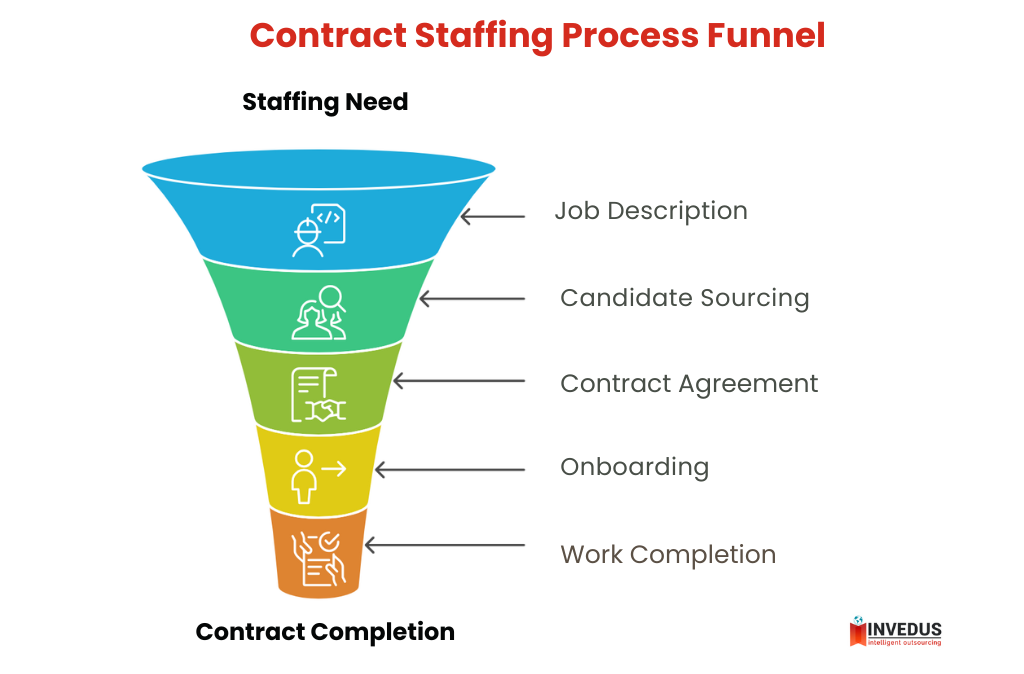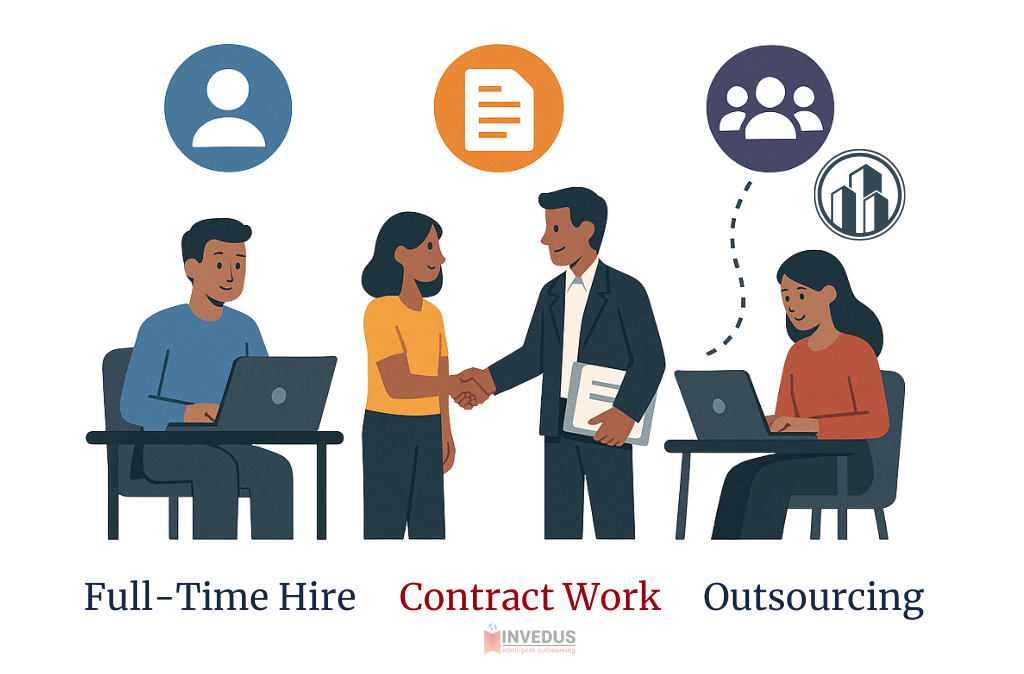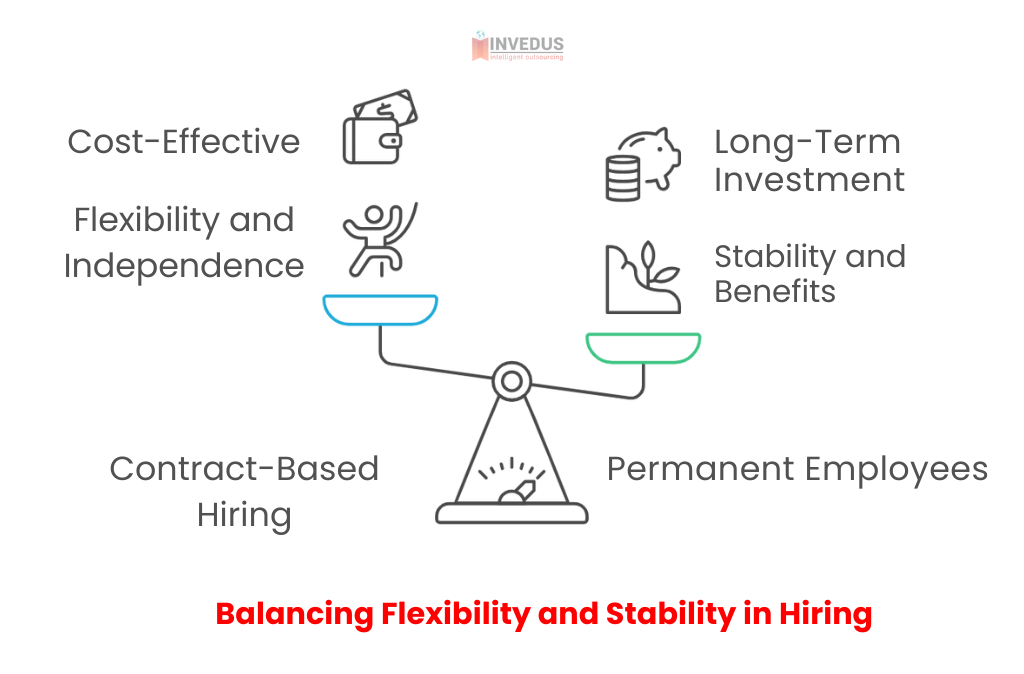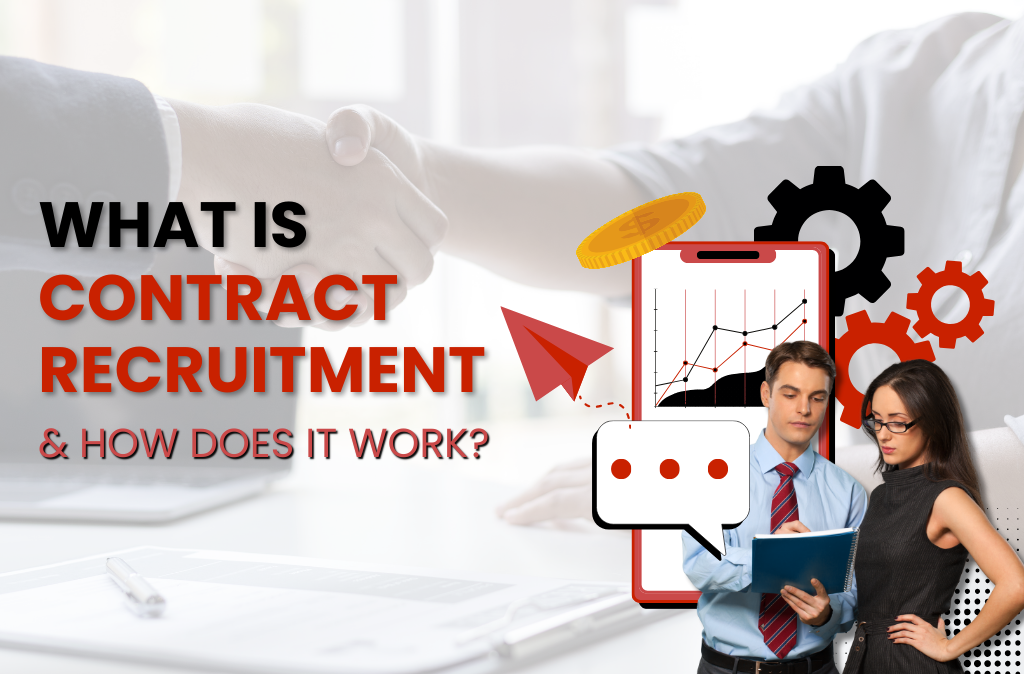Traditional hiring methods aren’t always the right call. Take for example your requirement for a graphic designer for a project. You might find yourself wondering about two things:
Are you going to hire full-time to face overheads? Or do you feel contractual hiring is better?
To help you never encounter such dilemmas, we have broken down what is contract recruitment, how it works, benefits, and compared it to other employment methods to help you make a smarter decision.
Key Takeaways:
- Contract recruitment offers flexibility for businesses needing short-term, specialized talent without the overhead of full-time employment.
- It works well for project-based needs, seasonal spikes, or when quickly filling skill gaps.
- Employers benefit from lower financial commitments, reduced risks of bad hires, and the chance to trial candidates before offering permanent roles.
- Employees gain career agility, higher hourly pay, exposure to diverse roles, and better work-life balance through flexible contract opportunities.
- The hiring process includes six steps: identifying the need, writing a job description, sourcing candidates, drafting a contract, onboarding, and closing or extending the contract.
- Contract hiring differs significantly from full-time and outsourced hiring in terms of cost, legal obligations, infrastructure needs, and scalability.
- Outsourcing is ideal for ongoing, non-core tasks, whereas contract hiring works best for time-limited or skill-specific roles.
- Choosing the right model: in-house, contract, or outsourced, depends on your budget, timeline, and business priorities.
What Is Contract Recruitment and Why Use It?
Contract recruitment also known as temporary staffing is the process of hiring remote talent on fixed terms for specific roles. This remote talent hiring is done through third-party providers or independent contractors.
Usually, a company decides to fill in positions through a contractual hire process because of project requirements, budgeting, or short-term needs. Unlike permanent employees, contract workers come with no overhead costs, like benefits, payroll taxes, equipment, training, and office space.
The period of their recruitment is always predetermined and increased incrementally unlike part-time employees who are hired by the company. Here are some reasons why you can consider hiring contractually:
- To meet urgent project needs or tight deadlines.
- Fill skill gaps and specializations that might be missing.
- Cover staff shortages, absences, and unexpected turnovers.
- To assist with seasonal uptick in work and responsibilities.
- For hiring faster and onboarding remote talent on time.
- Getting flexibility and agility to adjust company size according to market.
- Sustaining cost-effective resources and managing them easily.
All in All:
If you hire contract workers, you will be able to manage your number of resources better. Contractual hires are also completely different from part-time, permanent, and outsourced remote hires. You will learn about the differences between all down below.
The Benefits of Contract Recruitment Vs. Permanent Hire
In the long run, many think that permanent recruitment is more cost-effective and useful. But in many instances, contract recruiting is far superior. Here are some benefits that define the exact advantages of hiring temporarily:
1. Benefits of Contract Recruitment for Employers

Workforce Flexibility
You can scale your workforce according to your needs and wants. Whether you are onboarding a new project, facing seasonal peaks, or have a high turnover, all can be taken care of through temporary hires. Whereas, permanent positions don’t have the same level of flexibility.
Reduced Risk of Bad Hires
If your luck runs out and you hire a contract recruiter that isn’t what you hoped for, you can terminate their services. Permanent terms are more strict and always require serving of a notice period. The contracts can be revised and changed without any disruption. Though, you might also have to involve your legal team just to be sure.
Trial Towards Permanent Hiring
Most people who work in contract recruiter jobs perform great. The flexibility suits their lifestyle and sometimes organizations offer them permanent positions in return. This is a great exchange as sometimes the overall cost can be even more affordable. Directly hiring permanently doesn’t give companies the chance to be sure about the performance and other capabilities of the person.
Lower Financial Commitment
Financially, your commitment is almost nothing to minimal. As durations, working hours, and other agreements are made beforehand you pay what you have decided on. There is also no scope for extra pay as contractual hires have strict time distribution for their tasks. Permanent hires have a higher financial commitment in comparison as they require all overheads and other financial benefits like pensions and employment schemes.
Asses Their Fit into Company Culture
Not everyone you employ will be a great fit according to the culture of your company. But, because your hires work on contract, they have a trial period where you can asses them on cultural criteria. Mostly, hiring people full-time means they will always be a better fit, as your in-house staff vets them continuously. But if anything goes wrong, they are not that easy to replace.
2. Benefits of Contract Recruitment for Employees

Chance to Test New Roles or Industries
Contract recruitment allows many individuals to test or try out positions they might’ve previously wanted. They can explore career paths that are related to their current position or something they might have the education for but have not held before. Everything about this benefit is completely different when compared to full-time positions.
Higher Hourly Rates or Project Fees
The benefits might not come in traditional forms of promotions or bonuses but in the form of higher hourly rates. As the individual takes a risk by associating themselves with a contractual term, they mostly get paid higher than the market average of the position.
Faster Career Progression
New positions mean exposure to new strategies, tools, and challenges. All of this is quite beneficial to an employee who is trying to advance in their career path. Professionally, they can make their profile very attractive to get placed in bigger companies after fulfilling contractual work.
Stronger Professional Network
Your roles might be short-term, but your networking isn’t. Most people who only choose contractual work get connected with many other professionally mature individuals. This helps them stay connected to higher-value people for long-term benefits.
Flexibility and Work-Life Balance
Contract work is very flexible in terms of schedules, has remote options, and better control over work hours. This is very attractive to people who don’t want to be bound by endless hours of overtime or mandatory responsibilities related to their position.
Step-by-Step Breakdown of How Contract Staffing Works

Contracts are partly legal. Just like any other recruitment process, it also requires the correct sequence of events to land the best contract hire. Let’s learn what the steps required to hire contract placement.
1. Need Identification
It starts with a company understanding which positions they need to fill. Positions, like software developers, social media managers, legal assistants, accountants, and data entry assistants are the most common ones. Each department head is usually tasked with finding out whether a full-time or contractual hiring is required.
Here is a list of positions and the average rate that the market offers for contract recruiting:
- Software Developer (Full Stack / Backend / Frontend) – USA: $80–$180/hr, India: $20–$50/hr, Eastern Europe: $40–$100/hr, and Latin America: $40–$90/hr.
- Digital Marketing Specialist – SEO: $75–$150/hr, Content Marketing: $60–$120/hr, Social Media Management: $50–$100/hr, and PPC Management: $85–$150+/hr.
- Virtual Assistant – USA: $10–$40/hr and Outsourced (e.g., India, Philippines): $3–$20/hr.
- Graphic Designer – $15–$150/hr
- Data Analyst – $50–$120/hr
- Project Manager – $50–$150/hr
- Customer Support Representative – $20–$45/hr
- Financial Analyst – $30–$100/hr
- Human Resources (HR) Generalist – $25–$60/hr
- Quality Assurance (QA) Tester – $12–$20/hr
Disclaimer: Rates depend on experience and scope. Also according to your region, rates can vary. If you want to get exact rates, kindly browse job sites (LinkedIn, Indeed, Glassdoor, ZipRecruiter, and CareerBuilder) to know what is the current market rate.
2. Job Description Creation
The next step is to draft a clear job description. The outline has to be precise and should clearly mention the word “contract” in the description. There are more things that your JD should contain.
You can refer to this job description template or read our article dedicated to job descriptions to craft a custom one.
Sample Job Description Template for Contract Recruitment:
Position: Contract Digital Marketing Specialist
Location: Remote
Duration: 6 Months (with potential for extension)
Type: Contract
Hourly Rate: $40–$60/hr (based on experience)
About the Role
We’re looking for a skilled Digital Marketing Specialist on a contract basis to help drive our online marketing strategy, execute performance campaigns, and grow our digital presence across key platforms. This is a remote role ideal for a self-starter who thrives in fast-paced environments.
Key Responsibilities
- Plan, develop, and execute digital campaigns across Google Ads, Meta, and LinkedIn
- Optimize SEO and SEM strategies to improve site visibility
- Analyze campaign performance and generate actionable reports
- Manage content calendars for email and social platforms
- Collaborate with designers and copywriters to deliver aligned messaging
- Track KPIs and adjust tactics for continuous improvement
Required Skills and Qualifications
- 3+ years of experience in digital marketing
- Proficiency in Google Ads, Meta Ads Manager, Google Analytics, and SEO tools (Ahrefs, SEMrush, etc.)
- Strong understanding of conversion funnels, email marketing, and A/B testing
- Excellent communication skills and ability to work independently
- Experience with marketing automation tools (e.g., HubSpot, Mailchimp) is a plus
Contract Details
Start Date: Immediate
Duration: 6 months (extension possible)
Hours: Flexible; ~20–30 hrs/week
Compensation: $40–$60/hr, based on experience
Remote Work: Yes
How to Apply
Please send your resume, portfolio (if available), and a brief note outlining your relevant experience to [your@email.com]. Shortlisted candidates will be contacted for a quick virtual interview.
3. Candidate Sourcing
You have to find third-party agencies or a specialized contract recruiting agency that will shortlist your requirements right away. They are looking for suitable candidates for your position. They also can find professionals who might be looking for short-term or project-based work, which is often higher in pay.
4. Contract Agreement
After you have selected your candidate, a contract is the next thing you will need to provide. These are contracts that mention and specify all terms and conditions. You can prepare the agreement with the help of your legal team.
There are some mandatory clauses that should be in your contract-based agreement. You can find them below:
Key Clauses in a Temporary Staffing Contract:
- Parties Involved – Clearly name the staffing agency, the client company, and the temporary staff member (if applicable).
- Position and Scope of Work – Define the job title, duties, and expectations for the temporary role. Example: “The Contractor will serve as a Customer Support Associate handling inbound queries.”
- Duration of Contract – Mention the start and end dates or indicate if it’s project-based with a provision for early termination.
- Compensation and Payment Terms– State the agreed-upon rate (hourly/daily/monthly), frequency of payments (e.g., weekly), and mode of payment.
- Working Hours and Schedule – Define expected working hours, such as 9 AM to 5 PM, Monday to Friday, and note if any flexibility or overtime is expected.
- Confidentiality Clause – Include a basic confidentiality statement to protect sensitive business information shared during the contract period.
- Termination Terms – Explain how either party can end the contract, including notice period requirements (e.g., “7 days written notice”).
- Intellectual Property Rights – Clarify that all work produced belongs to the client or agency: “All deliverables and intellectual property developed during the engagement shall be the sole property of the Client.”
- Code of Conduct and Compliance – State that the temp staff must follow all workplace rules and policies, especially regarding behavior, communication, and safety.
- Dispute Resolution – Briefly mention how disputes will be handled, e.g., “Any disputes arising from this agreement shall be resolved via arbitration under [Jurisdiction] law.”
5. Onboarding and Work
Once hired, the biggest task for you will be to get them familiar with all work and team. As they will be joining for a specific time period, you need to guarantee that they are familiar with all the rules and arrangements. You should clear up with them that they won’t be entitled to standard employee benefits, such as health insurance or paid leave.
6. Contract Completion
At the end of the contract, you are faced with two choices. You can either terminate their contract as it is or extend it according to your terms. Remember, that most people only extend contracts if they feel that the relationship is beneficial to both the employer and the employee. Also, both parties can agree to extend or convert the contract to a permanent role.
Full-Time Hire vs. Contract Work vs. Outsourcing: What’s the Difference?

Before we break down things in greater detail, here is a table that condenses in simple words the differences between full-time hire vs. contract hire vs. outsourcing is.
| Aspect | Full-Time Hire | Contract Work | Outsourcing |
|---|---|---|---|
| Employment Type | Permanent employee on payroll | Temporary worker on a fixed contract | Third-party vendor or agency providing services |
| Average Cost (U.S.) | $75,000–$100,000/year + 25 to 40% in overhead (benefits, taxes, tools) | $35–$85/hour depending on role and expertise | $10 to $50/hour depending on region and service type |
| Hiring Timeframe | 30 to 45 days on average | 5 to 10 days | 1 to 7 days (agency-based or plug-and-play model) |
| Engagement Duration | Ongoing or indefinite | 1 week to 12 months (avg: 3–6 months) | Project-based or retainer (monthly/quarterly/annual) |
| Onboarding & Training | 2 to 4 weeks internal onboarding | 1 to 3 days of handover or task briefing | Typically none (Handled by provider) |
| Legal Obligations | Includes insurance, payroll tax, leave, health benefits | No benefits required; 1099 or freelance terms in the U.S. | Covered under service-level agreement (SLA); no direct employee obligations |
| Flexibility | Low (Fixed schedule, difficult to scale quickly) | Medium (Scalable and contract-adjustable) | High (Services can be scaled up/down monthly) |
| Infrastructure Required | Yes (Hardware, software licenses, office space, cost: $5K to $15K/year) | Often self-equipped or remote-friendly | No infrastructure required by the client |
| Control & Oversight | High (Employee follows direct supervision and reporting) | Medium (Partial autonomy with accountability) | Low (Managed by provider, client may set KPIs only) |
| Access to Expertise | Depends on hiring success and market availability | Direct access to niche or senior-level talent on demand | Access to large talent pools and multi-functional teams |
| Turnover Risk | Medium (1 to 2 years average tenure in high-churn roles) | Low (Bound by contract) | Very low (Backed by agency redundancy) |
| Scalability | Low (Requires full hiring cycle and budget approval) | Moderate (Can hire additional talent for short bursts) | High (Easy to scale team size or services) |
| Cost Predictability | Low (Unplanned costs e.g., insurance increases, retention bonuses) | Medium (Predictable within contract duration) | High (Fixed monthly or output-based billing) |
| Best For | Core business roles needing consistency and long-term retention | Time-bound projects or skill-specific gaps | Cost-efficient delivery of non-core or volume-heavy operations |
What Is a Full-Time Hire?
A permanent employee or full-time hire is an employee you hire to add to your team or in-house staff. The intention is for them to be associated with your company for the long term. Their working hours range from 35 to 40 hours per week.
Full-time hires usually have a set of responsibilities and they learn to adapt to the company culture. As part of your payroll, they receive a regular salary along with benefits like health insurance, paid leave, and sometimes equipment or office perks.
This should be your first choice if your budget allows it. In the long run, as your company expands, so will your employee count and such an employee can merge into a management or departmental role. While it comes with higher financial responsibility, you also gain greater consistency, loyalty, and control.
When Contract-Based Hiring Makes Sense

Independent contractors or contract recruiting is a more flexible way for companies to hire professionals. This method works on the agreement-based strategy and involves offering time-bound work that is in seasonal demand, project, or fulfills a specific business goal.
They share similar hours as to permanent employees, about 8 hours a day. But, the biggest differentiator is that they are not given any form of employee benefits. As the contract is strict and limited, these individuals only have the freedom to work independently.
The pay is a bit tricky though. Usually, the pay can also depend on the results they achieve for you like a consultant rather than an hourly-based employee. This reduces the financial burden on the companies, while still allowing the contractual hire to expand their skills and knowledge.
How Does Outsourcing Help Scale Your Business?
Outsourcing means assigning tasks or functions to an external team, provider, or assistant. It is a completely different recruitment model that hires individuals or many members from a third-party agency. They can be delegated various tasks from many chosen industries.
The most popular areas where most people outsource are: tech support, accounting, digital marketing, or customer service. Businesses of smaller and entrepreneurial sizes can take advantage of this model by hiring remote workers who are cost-effective and efficient.
Best part? Access to global talent who have predictable pricing, predefined levels of expertise, and more. This can help you manage the operational functions of your company while a dedicated virtual assistant handles all the delegated tasks.
In-House Assistant Vs. Contract Assistant Vs. Invedus Virtual Assistant

It is absolutely clear that contract hires are like no other. But, which is the best for your business model? Let us close the debate once and for all.
In-House Assistant
An in-house assistant is a full-time employee who works on-site or remotely and is part of your core internal team. They are salaried, typically work fixed hours, and receive company-provided benefits.
Where in-house staff is better:
- Long-term administrative support
- Direct team collaboration
- Confidential task handling
- Office or hybrid environment
The downsides of hiring permanent:
- High employment overhead
- Time-consuming hiring process
- Limited scalability
- Fixed working hours
So, you learned:
In-house assistants are ideal for businesses seeking full control and direct supervision but come with higher costs and lower flexibility.
Contract Assistant
A contract assistant is hired on a short-term or project-specific basis, often working independently. They are not part of your permanent staff and typically operate under a service contract.
Choose contract assistants if:
- Temporary workload surges
- Specialized short-term tasks
- Project-based assistance
- Event or seasonal work
What contract assistants lack:
- Limited loyalty or buy-in
- Varying quality standards
- May juggle multiple clients
- Inconsistent availability
This means that:
Contract assistants offer flexibility and expertise without long-term commitment, but may lack consistency and alignment with internal processes.
Invedus Virtual Assistant
An Invedus Virtual Assistant is a dedicated offshore professional hired through Invedus, a leading virtual staffing company. Unlike freelancers or temporary hires, these VAs are handpicked, fully trained, and work exclusively for your business on a full-time or part-time basis. You get all the benefits of a skilled employee, without the burden of overhead, hiring delays, or HR management.
Invedus Virtual Assistants are:
- Cost-efficient remote operations
- Scalable team expansion
- Dedicated admin, tech, and creative support
- Full-time work without full-time cost
- Custom assistant that handles all requests
- 24/7 coverage across time zones
Adjustments you will have to make:
- Initial task delegation setup
- Process adjustment for virtual workflows
All in all, you get:
Invedus Virtual Assistants offer the best of both worlds: the professionalism and dedication of an in-house employee, with the flexibility and affordability of outsourcing. Backed by a managed staffing model, Invedus handles recruitment, HR, and compliance which frees you to focus on growth.
For startups, entrepreneurs, and businesses seeking long-term yet affordable assistance, Invedus VAs deliver unmatched value, reliability, and scalability.
Our Thoughts
Contract recruiting might not be for everyone. However, nobody can deny the ease of hiring that it provides. You might not always get the best talent within your budget, but a contract can help you hire their skills and talent without a long-term financial investment.
If you are confused about whether you want to go contractual or trust outsourcing more, you can contact Invedus. We have a quick contract with 0 charges on offboarding. You also don’t need to pay for interviews you conduct with us.
So, don’t just let your project go, fulfill that requirement with Invedus.







